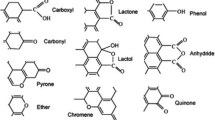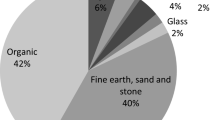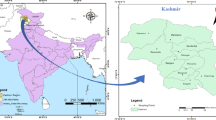Abstract
Mineralogical comparison of coal fly ash with soil and other material such as montmorillonite, charcoal was done by X-ray diffraction (XRD), thermo gravimetric analysis (TGA), Fourier-transform infrared spectroscopy (FTIR) and Scanning electron micrograph (SEM) with EDS. Fly ash showed high thermal stability with least weight loss as observed in TGA and SEM graph indicated that flyash is composed of spherical structures with more surface area for interaction; XRD and EDS studies showed that amorphous content of ash consists of calcium oxide, potassium and major crystalline phases observed were quartz (SiO2) and aluminum silicon oxide (Al4.52Si1.48) and haematite (Fe2O3). Charcoal, was amorphous in nature consisting of carbon and graphite. Soil and montmorillonite showed similar results in XRD, FTIR and thermal analysis having porous nature with silica as major constituent. Fly ash was found to be alkaline in nature having pH 7.85 and electrical conductivity 0.14 µS/m, good water holding capacity (62 %) and various macro and micronutrients as compared to other material viz. soil, charcoal, montmorillonite and hence, its mineralogical composition ascertains its applicability as a carrier for different microbial inoculants for soil application in agriculture which can act as an economic source of nutrient supplement for crop plants.








Similar content being viewed by others
References
Lokeshappa B, Dikshit AK (2011) Metals and their leachings in coal fly ash ponds, National Conference on Environmental Perspectives and Challenges for the 21st Century (EPC-2011), Andhra University, Visakhapatnam, India., June 28–29
Kumar V, Mathur M, Sinha SS, Dhatrak S (2005) Fly ash environmental saviour. New Delhi, India: Report submitted to Fly ash Utilization Programme (FAUP) to TIFAC, DST
Skousen J, Yang JE, Lee JS, Ziemkiewicz P (2013) Review of fly ash as a soil amendment. Geosyst Eng 16:249–256
Jala S, Goyal D (2006) Fly ash as a soil ameliorant for improving crop production—a review. Bioresour Technol 97:1136–1147
Pichtel JR, Hayes JM (1990) Influence of fly ash on soil microbial activity and populations. J Environ Qual 19:593–597
Gaind S, Gaur AC (2002) Impact of fly ash and phosphate solubilising bacteria on soybean productivity. Bioresour Technol 85:313–315
Gaind S, Gaur AC (2003) Quality assessment of compost prepared from fly ash and crop residues. Bioresour Technol 87:125–127
Singh S, Gond D, Pal A, Tewary B, Sinha A (2011) Performance of several crops grown in fly ash amended soil. In: 2011 World of coal ash (WOCA) conference, May 9–12, 2011, Denver, CO. http://energy.caer.uky.edu/AshSymposium.AshLibraryAgenda.asp#2011
Querol X, Umana JC, Alastuey A, Bertrana C, Soler AL, Plana F (1999) Physicochemical characterization of spanish fly ashes. Energ Sour Part A 21:883–898
Adholeya A, Bhatia NP, Kanwar S, Kumar S (1998) Fly ash source and substrate for growth of sustainable agro-forestry system. In: Proceedings of Regional workshop cum symposium on Fly ash disposal and utilization, Organized by Kota thermal power station, RSEB, Kota, Rajasthan, India
Basu M, Pande M, Bhadoria PBS, Mahapatra SC (2009) Potential fly-ash utilization in agriculture: a global review. Prog Nat Sci 19:1173–1186
Singh VM (2009) Micro nutritional problem in soils of india and improvement for human and animal health. Indian J Fert 5(4):11–16
Lee H, Ha HS, Lee CS, Lee YB, Kim PJ (2006) Fly ash effect on improving soil properties and rice productivity in Korean paddy soil. Bioresour Technol 97:1490–1497
Elseewi AA, Straughan IR, Page AL (1980) Sequential cropping of fly ash amended soils: effects on soil chemical properties and yield and elemental composition of plants. Sci Total Environ 15:247–259
Wong MH, Wong JWC (1989) Germination and seedling growth of vegetables, crops in fly ash amended soils. Agric Ecosyst Environ 26:23–25
Hata T, Imamura Y, Ishihara S, Nishimiya K (1998) Analysis of chemical structure of wood charcoal by X-ray photoelectron spectroscopy. Jpn Wood Res Soc, 56–61
Pulido LL, Ishihara S, Kajimoto T, Ide I (1996) Development of environmental protection wood charcoal composites from toxic heavy metal. II. In: Abstracts of 46th Annual Meeting of the Japan Wood Research Society, Kumamoto, April 3–5, p 476
Nenadovic S, Nenadovic M, Kljajevic L, Pavlovic V (2010) Structure and compositions of soils. Processing and application of Ceramica 4:259–263
Paluszkiewicz C, Stodolak E, Hasik M, Blazewicz M (2011) FT-IR study of montmorillonite-chitosan nanocomposite materials. Spectrochim Acta Part A 79:784–788
Xue W, He H, Zhu J, Yuan P (2007) FTIR investigation of CTAB-Al-montmorillonite complexes. Spectrochim Acta Part A 67:1030–1036
Goyal V, Angar MR, Srivastava DK (2002) Studies on the effect of fly ash treated soil on the increased protein contents in the seeds of Glycine max (soyabean). Asian J Chem 14(1):328–332
Zielinski RA, Finkelman RB (1997) Radioactive elements in coal and flyash: abundance, forms, and environmental significance. US Geological Survey Fact Sheet FS-163-97. http://www.acaa.usa.org/PDF/FS-163-97.pdf
Ram LC, Masto RE (2010) “Review”: an appraisal of the potential use of fly ash for reclaiming coal mine spoil. J Environ Manage 91:603–617
Mittra BN, Karmakar S, Swain DK, Ghosh BC (2003) Fly ash—a potential source of soil amendment and a component of integrated plant nutrient supply system. International Ash Utilization Symposium, Centre of Applied Energy Research, University of Kentucky. Paper# 28. http://www.flyash.info/2003/28mit.pdf
Punshon T, Adriano DC, Weber JT (2002) Restoration of drastically eroded land using coal fly ash and poultry biosolid. Sci Tot Environ 296:209–225
Kalra N, Joshi HC, Chaudhary A, Chaudhary R, Sharma SK (1997) Impact of fly ash incorporation in soil on germination of crops. Bioresour Technol 61:39–41
Singh M, Gill JK, Kumar S, Singh K (2012) Preparation of Y2Ti2O7 pyrochlore using high-energy ball milling and their structural, thermal and conducting properties. Ionics 18:479–486
Page AL (1982) Methods of soil analysis part II soil science. Society of America, Madison
Sugita R, Marumo Y (2001) Screening of soil evidences by a combination of simple techniques: validity of particle size distribution. Forensic Sci Int 122:155–158
Black CA, Evans DD, White JL, Ensmingher LE, Clarke FE, Dinauer RC (1965) Methods of soil analysis. Part 1-Physical and mineralogical properties including statistics of measurement and sampling, 9 Series Agronomy. American Society of Agronomy Inc, Madison
Jackson ML (1967) Soil chemical analysis. Prentice Hall of India Pvt. Ltd., New Delhi
Lee SH, Sakai E, Daimon M, Bang WK (1999) Characterization of fly ash directly collected from electrostatic precipitator. Cem Concr Res 29:1791–1797
Adriano DC, Weber JT (2001) Influence of fly ash on soil physical properties and turfgrass establishment. J Environ Qual 30:596–601
Shen ZG, Li XD, Wang CC, Chen HM, Chua H (2002) Lead phytoextraction from contaminated soil with high biomass plant species. J Environ Qual 31:1893–1900
Singh SN, Kulshreshtha K, Ahmad KJ (1997) Impact of fly ash soil amendment on seed germination, seedling growth and metal composition of Vicia faba L. Ecol Engg 9:203–208
Nishimiya K, Hata T, Imamura Y, Ishihara S (1998) Analysis of chemical structure of wood charcoal by X-ray photoelectron spectroscopy. J Wood Sci 44:56–61
Pereira BLC, Carneiro ACO, Carvalho AMML, Colodette JL, Oliveira AC, Fontes MPF (2013) Influence of chemical composition of Eucalyptus Wood on gravimetric yield and charcoal properties. Bioresourc 8(3):4574–4592
Seshadri P, Sisk D, Bowman F, Benson S, Seames W (2011) Leachability of arsenic and selenium in submicron coal fly ash. In: 2011 World of coal ash (WOCA) conference, May 9–12, 2011, Denver, CO. Retrieved 15 Aug 2013
Zhao J, Yang L, Li F, Yu R, Jin C (2009) Structural evolution in the graphitization process of activated carbon by high-pressure sintering. Carbon 47:744–751
Sushil S, Batra VS (2006) Analysis of fly ash heavy metal content and disposal in three thermal power plants in India. Fuel 85:2676–2679
Kuceba M, Nowak W (2004) Thermal analysis of fly ash-based zeolites. J Therm Anal Calorim 77:125–131
Cohen OL, Weiner L, Boaretto E, Mintz G, Weine S (2006) Modern and fossil charcoal: aspects of structure and diagenesis. J Archaeol Sci 33(3):428–439
http://natres.psu.ac.th/Link/SoilCongress/bdd/symp40/681-t.pdf
Cox RJ, Peterson HL, Young BS, Cusik CBS, Espinoza EO (2000) The forensic analysis of soil organic by FTIR. Forensic Sci Int 108:107–116
Skavara F, Kopecky L, Nimeeek J, Bittnar Z (2006) Microstructure of geopolymer materials based on fly ash. Ceram Silik 50(4):208–215
Murayama NT, Yamamoto H, Shibata J (2003) Reaction, mechanism and application of various zeolite syntheses from coal fly ash. Mater T 44(12):2475–2480
Querol X, Moreno N, Umana JC, Alastuey A, Hernandez E, Soler AL, Plana F (2002) Synthesis of zeolites from coal fly ash: an overview. Int J Coal Geol 50:413–423
Choe E, Meer VDF, Rossiter D, Salm C, Kim KW (2010) An alternate method for fourier transform infrared (FTIR) spectroscopic determination of soil nitrate using derivative analysis and sample treatments. Water Air Soil Pollut 206:129–137
Bishop LJ, Murad E (2004) Characterisation of minerals and biogeochemical markers on mars: a Raman and IR spectroscopic study of montmorillonite. J Raman Spectrosc 35:480–486
Paluszkiewicz C, Holtzer M, Bobrowski A (2008) FTIR analysis of bentonite in moulding sands. J Mol Struct 880:109–114
Patel HA, Somani RS, Bajaj HC, Jasra RV (2007) Preparation and characterization of phosphonium montmorillonite with enhanced thermal stability. Appl Clay Sci 35:194–200
Tyagi B, Chudasama CD, Jasra RV (2006) Determination of structural modification in acid activated montmorillonite clay by FT-IR spectroscopy. Spectrochim Acta Part A 64:273–278
Barbara G, Kutchko Kim AG (2006) Fly ash characterization by SEM-EDS. Fuel 85(17):2537–2544
Yilmaz G (2012) Structural characterization of glass-ceramics made from fly ash containing SiO2-Al2O3-Fe2O3-CaO and analysis by FT-IR-XRD-SEM methods. J Mol Struct 37:37–42
Ram L, Masto R (2009) An appraisal of the potential use of fly ash for reclaiming coal mine spoil. J Environ Manage 91:603–617
Ram LC, Masto RE, Singh S, Tripathi RC (2011) “Review”, An appraisal of coal fly ash soil amendment technology (FASAT) of central Institute of Mining and Fuel Research (CIMFR). World Acad Sci Eng Technol 52:703–714
Khan MW, Khan MR (1996) The effect of fly ash on plant growth and yield of tomato. Env Pollut 92(2):105–111
Page AL, Elseewi AA, Straughan IR (1979) Physical and chemical properties of fly ash from coal-fired power plants with special reference to environmental impacts. Residue Rev 71:83–120
Macht F, Totsche KU, Eusterhues K, Pronk G (2010) Topography and surface properties of clay minerals analyzed by atomic force microscopy. 19th World Congress of Soil Science, Soil Solutions for a Changing World. 1–6 August 2010, Brisbane, Australia, pp 206–209
Chitale VVD, Sigal R (2000) Halliburton energy services; Conference paper: NMR characterization of the water adsorbed by montmorillonite: impact on the analysis of porosity logs. Society of Petroleum Engineers. SPE/AAPG Western Regional Meeting, 19–22 June 2000, Long Beach, California, 10.2118/62531
Sharma KS, Kalra N (2006) Effect of fly ash incorporation on soil properties and productivity of crops: a review. J Sci Ind Res 65:383–390
Acknowledgment
The authors are thankful to Director, Thapar University, Patiala and Science & Technology Entrepreneur’s Park (STEP), TU, for providing infrastructural and support and to Fly ash unit (FAU), Department of Science &Technology (DST) and National Bank for Agriculture and Rural Development (NABARD) for financial support.
Author information
Authors and Affiliations
Corresponding author
Rights and permissions
About this article
Cite this article
Kaur, R., Goyal, D. Mineralogical comparison of coal fly ash with soil for use in agriculture. J Mater Cycles Waste Manag 18, 186–200 (2016). https://doi.org/10.1007/s10163-014-0323-1
Received:
Accepted:
Published:
Issue Date:
DOI: https://doi.org/10.1007/s10163-014-0323-1




